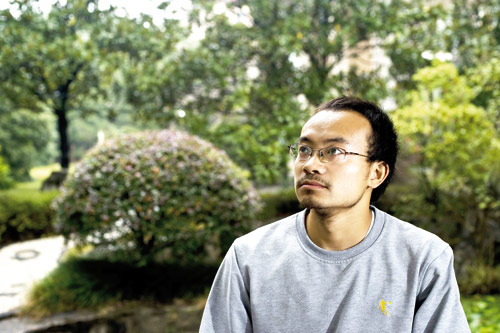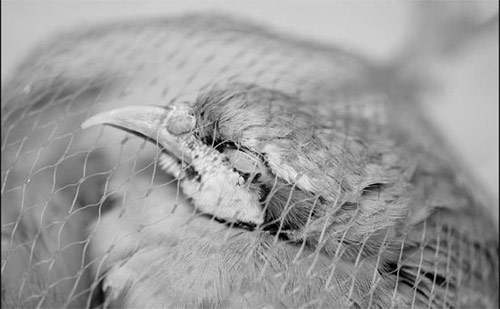Cries of mother earth
Updated: 2012-11-01 10:41
By Pu Zhendong (China Daily)
|
||||||||
 |
|
Gao Liang has finished a 35-day trip to investigate the status of environmental protection in Hunan province. Xie Changgui / For China Daily |
 |
|
A confiscated bird from a black market at Guidong county of Hunan province. Li Feng / For China Daily |
A sophomore conducted an ecological expedition in Hunan province during summer and is ashamed to discover that man is the main killer of nature. Pu Zhendong reports.
Although it's been two months, Gao Liang still has nightmares about the fury on the night of Aug 15 - the sound of gunshots, bird squealing, followed by people bustling in ecstasy.
Related: Paradise of birds
It was the hunting season for residents from Jinlan village, Guidong county of Chenzhou, in Hunan province.
"The villagers are not only catching the birds for money, they do it for fun," Gao says. "During the migration season, men and women, young and old, head out to the mountains to hunt. The whole scene is like a carnival."
Twenty-year-old Gao, a sophomore at Changsha Environmental Protection College in Hunan province, went to the village as part of his field study to investigate the status of environment protection in the province.
He started his expedition on July 16 and covered more than 1,000 kilometers in 35 days.
From his research, he discovered that Jinlan village - located in the line of migratory birds - has observed the tradition of fowling for hundreds of years. Hunting season starts in late April when millions of migratory birds flock to the village, which lies south of the Luoxiao Mountains. By late September, the birds will leave the mountains and head south.
At 7:00 pm on Aug 15, Gao set up his tent about 1 km from the spot where about 30 excited hunters ambushed. A villager revealed the killing ground to him.
It was a starry night, Gao recalls, and the village was silhouetted in peace. Yet what was to come was dreadful.
"The villagers used flashlights to draw the birds' attention," Gao says.
At about 7:40 pm, a blast of shooting broke the tranquility. What followed was a mix of sounds: birds shrieking and hunters wielding weapons of bamboo poles, guns and nets. In the darkness, Gao could only hear birds falling one after another, shrilling in agony. The shooting did not stop until dawn broke.
"During migration season, the villagers reap about one metric ton of birds. Among the prey, one can also find rare species of swans, white cranes and gray herons," he says.
Gao videotaped the entire slaughter process. He shed tears. He wrote this in his diary: "Sad and sleepless, I am ashamed of human beings ... don't know what I should do next."
On Aug 20, Gao completed his 22-county, on-foot endeavor at Chaling county of Zhuzhou, carrying back with him materials including two-hour video footages, more than 2,000 pictures and a 30,000-word written record on subjects such as forest protection, illegal fowling and hunting. He has been sorting out his materials into a research report.
Back in campus, Gao has another identity, the vice-president of Yishui Harmony Society, a club devoted to promoting eco-awareness and conducting environmental surveys. With the help of teammates, he is now preparing a photo exhibition and an experience-sharing seminar.
Gao won respects from his classmates and friends after a local TV highlighted the news of illegal hunting in mid-October, which prompted the authorities to clamp down on the activity.
"He was ahead of them," says Li Ke, Gao's classmate.
Some people may view Gao as a "crazy environmentalist". In February, he dressed and painted himself like a bear, and put on a show of extracting live bear bile in the student canteen when the scandal was at its height.
"By adopting such radical actions, I hope people will be able to empathize better," Gao says. "Birds, animals and plants all have feelings. The only difference is that they don't have wisdom like human beings."

Born in Xiaogan, Hubei province, Gao started giving serious thoughts to the environment in high school, when the pollution and the drying of his hometown river caught his attention. After graduation, he chose the Changsha Environmental Protection College, which offers him an opportunity to put what he learned into practice.
"I will continue my efforts on eco-investigation in Hunan province," says Gao, adding that he plans to travel to the cities of Yiyang, Yueyang and Changde during his next semester break for another ecological expedition.
"Hopefully, I can turn my interest in environmental protection into my future profession," he says.
Contact the writer at puzhendong@chinadaily.com.cn.

 'Taken 2' grabs movie box office crown
'Taken 2' grabs movie box office crown
 Rihanna's 'Diamonds' tops UK pop chart
Rihanna's 'Diamonds' tops UK pop chart
 Fans get look at vintage Rolling Stones
Fans get look at vintage Rolling Stones
 Celebrities attend Power of Women event
Celebrities attend Power of Women event
 Ang Lee breaks 'every rule' to make unlikely new Life of Pi film
Ang Lee breaks 'every rule' to make unlikely new Life of Pi film
 Rihanna almost thrown out of nightclub
Rihanna almost thrown out of nightclub
 'Dark Knight' wins weekend box office
'Dark Knight' wins weekend box office
 'Total Recall' stars gather in Beverly Hills
'Total Recall' stars gather in Beverly Hills
Most Viewed
Editor's Picks

|

|

|

|

|

|
Today's Top News
Health new priority for quake zone
Xi meets US top military officer
Japan's boats driven out of Diaoyu
China mulls online shopping legislation
Bird flu death toll rises to 22
Putin appoints new ambassador to China
Japanese ships blocked from Diaoyu Islands
Inspired by Guan, more Chinese pick up golf
US Weekly

|

|







